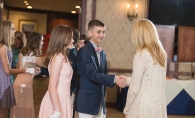
On a typical day at Minnetonka High School, the Writing Center is abuzz with activity well before classes even start. As early as 7 a.m., students flock to the room to discuss their latest written work with trained coaches. Whether they need help with a paper for class or are seeking feedback on their own creative projects, Minnetonka students gain valuable insight through these one-on-one meetings. By asking questions, suggesting strategies and offering thoughtful feedback, coaches help students make sense of their ideas, guiding them from brainstorming to polished final drafts—and all the coaches are MHS students themselves.
This year marks the Writing Center’s 10th anniversary. Although centers like this one are common on college campuses, they’re rarer in high schools, making Minnetonka’s even more of a gem. Maggie Shea and Krista Hitchcock work as the Writing Center’s full-time coordinators and say the center has always felt like a natural fit for Minnetonka. It found early support in an endowment from the Minnetonka Public Schools Foundation, which liked the Writing Center’s ability to serve all students, not just a niche group.
“The school has a really rich writing culture. It already did when we started,” says Shea. “There’s so much writing in every discipline here, [so] it felt like a really good fit.”
Any number of things might happen in the Writing Center day-to-day. Teachers bring their classes in for a writing-intensive period, or Shea and Hitchcock might act as support teachers or host a writing workshop. But the individual conferences, says Hitchcock, are “the core of what we do.” Throughout its decade-long history, the Writing Center has been the site of hundreds of one-on-one meetings and served thousands of students in the process. That individualized attention is powerful. “Some students really open up in a different way to a peer, especially a trained peer who’s there to actively listen and to give coaching and style feedback instead of editing,” Shea says.
“In a classroom of 30 kids, it’s hard to get those moments,” adds Hitchcock.
The coaches can testify to the power of those moments as well. Sophomore Meili Gong says, prior to becoming a coach, she hadn’t considered herself much of a writer. Now she loves helping other students discover a love for the written word. “The most rewarding thing to me is when I’m in a conference, and I help a writer enjoy their writing better or help them get their paper to a place where they’re proud of it,” says Gong.
“I think it’s really cool to see how the Writing Center can promote a culture that celebrates English as a subject and writing as a skill within the school,” says junior Luke Bunday, a second-year writing coach.
The Writing Center also hosts events, including the annual Off the Page!, in which students conduct on-stage interviews with professionals who use writing in their work. Coaches also write and edit a blog, host the Writer’s Studio—an open-mic literature reading—and are always coming up with new programs. Hitchcock says, “If they have an idea, this is a place where they can plant a seed and have the seed grow.”
Follow the Writing Center on Twitter @tonkawrites and check out the student-written blog here.









